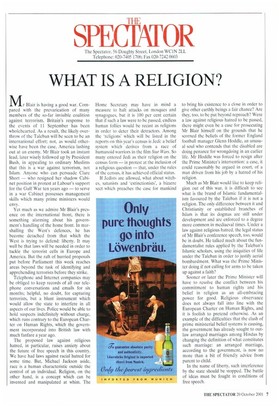SPE [ 'GATOR
The Spectator, 56 Doughty Street, London WC1N 2LL Telephone: 020-7405 1706; Fax 020-7242 0603
WHAT IS A RELIGION?
Mr Blair is having a good war. Compared with the prevarication of many members of the so-far invisible coalition against terrorism, Britain's response to the events of 11 September has been wholehearted. As a result, the likely overthrow of the Taleban will be seen to be an international effort; not, as would otherwise have been the case, America lashing out at an enemy, Mr Blair took an instant lead, later wisely followed up by President Bush, in appealing to ordinary Muslims that this is a war against terrorism, not Islam. Anyone who can persuade Clare Short — who resigned her shadow Cabinet position in protest at Labour's support for the Gulf War ten years ago — to serve in a war Cabinet possesses management skills which many prime ministers would envy.
Yet much as we admire Mr Blair's presence on the international front, there is something alarming about his government's handling of the home front. In marshalling the West's defences, he has become detached from that which the West is trying to defend: liberty. It may well be that laws will be needed in order to tackle the terrorist cells in Europe and America. But the raft of hurried proposals put before Parliament this week reaches areas beyond the task of identifying and apprehending terrorists before they strike.
Telephone and Internet companies may be obliged to keep records of all our telephone conversations and emails for six months; helpful, no doubt, for capturing terrorists, but a blunt instrument which would allow the state to interfere in all aspects of our lives. Police would be able to hold suspects indefinitely without charge, which runs contrary to the European Charter on Human Rights, which the government incorporated into British law with much fanfare a year ago.
The proposed law against religious hatred, in particular, raises anxiety about the future of free speech in this country. We have had laws against racial hatred for some time. But, Michael Jackson aside, race is a human characteristic outside the control of an individual. Religion, on the other hand, is a concept which can be invented and manipulated at whim. The Home Secretary may have in mind a measure to halt attacks on mosques and synagogues, but it is 100 per cent certain that if such a law were to be passed, endless human follies would be recast as religions in order to deter their detractors. Among the 'religions' which will be listed in the reports on this year's census is Jedi: a belief system which derives from a race of humanoid warriors in the film Star Wars. So many entered Jedi as their religion on the census form — in protest at the inclusion of a religious question — that, under the rules of the census, it has achieved official status.
If Jedists are allowed, what about witches, satanists and extinctionists', a bizarre sect which preaches the case for mankind to bring his existence to a close in order to give other earthly beings a fair chance? Are they, too, to be put beyond reproach? Were a law against religious hatred to be passed, there might even be a case for prosecuting Mr Blair himself on the grounds that he scorned the beliefs of the former England football manager Glenn Hoddle, an unusual soul who contends that the disabled are doing penance for wrongdoing in an earlier life. Mr Hoddle was forced to resign after the Prime Minister's intervention: a case, it could reasonably be argued in court, of a man driven from his job by a hatred of his religion.
Much as Mr Blair would like to keep religion out of this war, it is difficult to see what is the brand of Islamic fundamentalism favoured by the Taleban if it is not a religion. The only difference between it and Christianity or established branches of Islam is that its dogmas are still under development and are enforced to a degree more common in mediaeval times. Under a law against religious hatred, the legal status of Mr Blair's conference speech, too, would be in doubt. He talked much about the fundamentalist rules applied by the Taleban's Islamic scholars, using the iniquities of life under the Taleban in order to justify aerial bombardment. What was the Prime Minister doing if not calling for arms to be taken up against a faith?
Sooner or later the Prime Minister will have to resolve the conflict between his commitment to human rights and his belief in religion as an all-embracing power for good. Religious observance does not always fall into line with the European Charter on Human Rights, and it is foolish to pretend otherwise. As an example of the difficulties that the clash of prime ministerial belief systems is causing, the government has already sought to outlaw arranged marriages among Hindus by changing the definition of what constitutes such marriage: an arranged marriage, according to the government, is now no more than a bit of friendly advice from parent to child.
In the name of liberty, such interference by the state should be stopped. The battle of ideas must be fought in conditions of free speech.


























































































 Previous page
Previous page